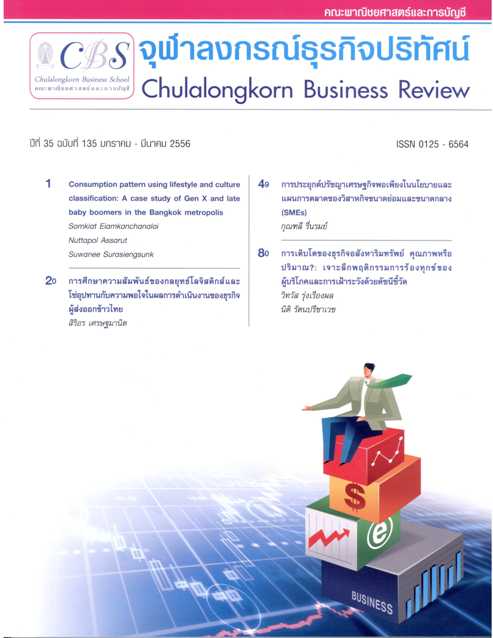การศึกษาความสัมพันธ์ของกลยุทธ์โลจิสติกส์และโซ่อุปทานกับความพอใจในผลการดำเนินงานของธุรกิจผู้ส่งออกข้าวไทย
Main Article Content
Abstract
งานวิจัยนี้มีวัตถุประสงค์เพื่อศึกษาการนำกลยุทธ์โลจิสติกส์และโซ่อุปทานมาใช้ในธุรกิจผู้ส่งออกข้าวไทย และผลกระทบของการใช้กลยุทธ์ดังกล่าวต่อระดับความพอใจในผลการดำเนินงานทั้งด้านผลตอบแทนทางการเงินและต้นทุน โดยประชากรที่ศึกษาคือผู้ประกอบการธุรกิจขายส่งข้าวและผลิตภัณฑ์จากโรงสีข้าวที่มีรายชื่ออยู่ในรายชื่อผู้ส่งออกข้าวหอมมะลิไทยที่ได้รับอนุญาตให้ใช้เครื่องหมายรับรองข้าวหอมมะลิไทย จากการวิเคราะห์กลุ่มตัวอย่าง 150 บริษัทพบว่าในภาพรวมนั้นธุรกิจในอุตสาหกรรมข้าวมีความพอใจในผลการดำเนินงานของธุรกิจทั้งในด้านผลตอบแทนทางการเงินและด้านต้นทุน ยกเว้นในด้านต้นทุนค่าขนส่งสินค้า ในส่วนของกลยุทธ์ที่องค์กรใช้นั้น พบว่ากลยุทธ์ระดับองค์กรที่มีการใช้มากที่สุดคือกลยุทธ์การจัดซื้อ/จัดหา/การผลิตจากภายในองค์กร ส่วนกลยุทธ์ระดับธุรกิจนั้นพบว่ากลยุทธ์ด้านความรวดเร็วในการตอบสนองความต้องการของตลาดและกลยุทธ์ด้านต้นทุนมีการใช้มากที่สุด สำหรับกลยุทธ์ด้านการดำเนินงานนั้นพบว่ากลยุทธ์การจัดการความสัมพันธ์กับซัพพลายเออร์และการนำระบบการจัดการคลังสินค้า (WMS) มีการนำมาใช้มากที่สุด อย่างไรก็ดีจากการวิเคราะห์ความสัมพันธ์ระหว่างกลยุทธ์ที่ใช้กับความพอใจในผลการดำเนินงานนั้นพบว่าองค์กรที่ใช้กลยุทธ์การจัดซื้อ/จัดหา/การผลิตจากองค์กรภายนอก กลยุทธ์การบูรณาการในแนวดิ่งหรือกลยุทธ์การบูรณาการในแนวราบจะมีความพอใจในผลการดำเนินงานมากกว่าองค์กรที่ไม่ได้ใช้ สำหรับกลยุทธ์ด้านการดำเนินงานนั้นพบว่ามีเพียงการใช้กลยุทธ์ด้านการจัดซื้อเท่านั้นที่ส่งผลกระทบในทางบวกต่อความพอใจในผลการดำเนินงาน
คำสำคัญ: กลยุทธ์โลจิสติกส์และโซ่อุปทาน ความพอใจในผลการดำเนินงาน ผลตอบแทนด้านการเงิน การจัดการต้นทุน การศึกษาความสัมพันธ์ ธุรกิจผู้ส่งออกข้าว
Abstract
The objectives of this research is to study the use of logistics and supply chain strategies of Thai Rice Exporters and to investigate the relationship between the usage of such strategies and the performance of business both in financial returns and costs. The population of this study is wholesale businesses of rice and rice mill products which are listed in the List of Company Licensed by Department of Foreign Trade for "Thai Hom Mali Rice Certification". From the analysis of 150 respondents, it was found that overall businesses in this industry are satisfied with their financial returns and costs except transportation costs. Regarding the strategy used, In-sourcing strategy is the most used strategy at the organization level. At business level, Speed/Quick Response strategy and Cost leadership strategy are the most used. For operations strategy, supplier relationship management (SRM) and warehouse management system (WMS) are used more often than other strategies. Nevertheless, the analysis of the relationship between the satisfaction on business performance and the strategy used shows that businesses that use Outsourcing strategy, Vertical integration strategy, or Horizontal integration strategy are more satisfied with their performances than the one that does not use such strategies. Furthermore, for operations strategy, only strategy related to purchasing and procurement has positive impact on performance satisfaction.
Keywords: Logistics and supply chain strategy, Performance satisfaction, Financial returns, Cost management, Relationship study, Thai Rice Exporters
Article Details
Opinions and discussions in papers published by the Creative Business and Sustainability Journal (CBSJ) are deemed as personal opinions and the responsibility of the writers. They are not the opinions or responsibility of the Chulalongkorn Business School of Chulalongkorn University.
Papers, content, information etc. appearing in the Journal are deemed to be the copyright property of the Chulalongkorn Business School of Chulalongkorn University. Anybody or any organization that wishes to publish any part of them or use them in any way must obtain written permission from the Chulalongkorn Business School, Chulalongkorn University.


